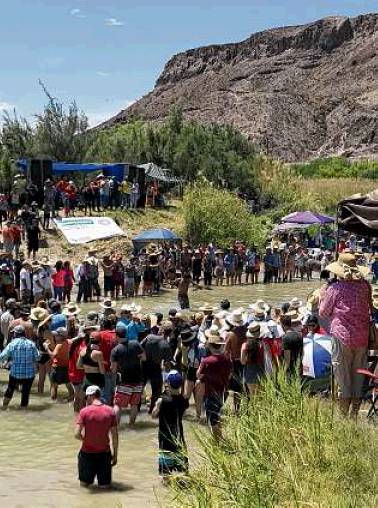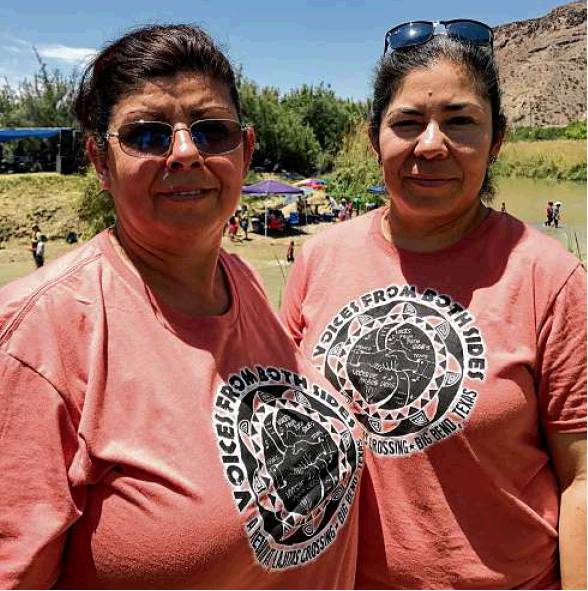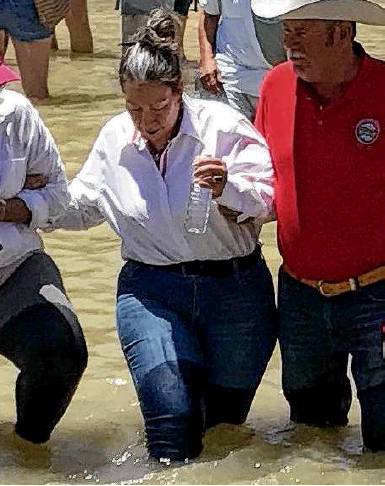NATIVE TEXAN
At border festival, neighbors wade in political waters
LAJITAS — Standing on the slippery bank of the Rio Grande last Saturday afternoon, the thermometer flirting with the century mark, I watched a tall, regal woman in jeans, boots and a white western shirt step into the stream from the Mexican side and carefully make her way across. Her husband held one arm and a young friend the other as they forded the river at the historic Lajitas Crossing. From the American side, a loudspeaker blared the Flatlanders’ “Borderless Love” (“where there’s no need for a wall at all”); on the Mexican side, Conjunto Furia Nortena offered up a jaunty tune of its own.
Voices From Both Sides Festival-goers either frolicked in the water or chatted with friends who lived across the river. Some were barefoot and wore shorts or swim suits; others waded into the thigh-high water in their jeans and boots. I noticed one young man in a floating chair reading a book, oblivious to the cheerful crowd on both banks and in the water. Parked on a bluff high above the river was a white SUV with the broad green slash of the U.S. Border Patrol on its door.
The woman I watched crossing the international border was Maria de Jesus Villanueva, the mayor of San Carlos, a small town about 10 miles south (known officially as Manuel Benavides).
As her honor, the mayor, explained to me en espanol, with her young friend translating, she waded across to visit with friends and relatives who live on this side of the river, but she was making a symbolic gesture, as well. She was commemorating a time not long ago when ties of friendship and community transcended border barriers, when the river separating two nations was merely an inconvenience running through a cohesive bi-national community. She and her fellow revelers wish for that again, for a time when Lajitas was one of several “unpatrolled ports of entry” in this ruggedly beautiful, sparsely populated Big Bend region.
“I wish President Trump could see this,” Villanueva told me. “He needs to come here.”
I’m guessing the president won’t be coming to Lajitas any time soon — Laredo friends tell me he was reluctant to get out of his limousine when he made a quick campaign visit to their city — but for the past five years close to a thousand people annually have gathered for the Voices from Both Sides Festival. Their aim is to restore ties between Lajitas and Paso Lajitas across the river, ties that existed for decades before they were abruptly severed nearly 16 years ago.
Neither presidents nor governors have showed up for the partying, the music and the reunions that have taken place every year since 2013, but the Brewster County judge, among other officials, was on hand last Saturday. “I’m a therapist, a counselor, and I realize that this country’s border policy is based on fear,” County Judge Eleazar Cano told me. “Look at all these people. This is a good interpretation of what our state is all about.”
A scruffy, trading post
Lajitas, at the western edge of Big Bend National Park, is about as far away from the rest of the state as you can get. Its tiny Mexican counterpart is just as isolated. The rugged desert region was long inhabited by indigenous tribes, until Apaches and later Comanches drove them out in the 18th and 19th centuries. Anglo-Americans showed up in the mid-1800s. In the 1890s, quicksilver was discovered near Terlingua, 11 miles to the north, attracting miners, speculators and folks on the lam from somewhere else. Across the river, in the states of Chihuahua and Coahuila, cattle ranches and mining enterprises sprang up. With increased commerce across the Rio Grande, Lajitas was designated a substation port of entry. By 1912, the town boasted a store, a saloon, a school with 50 pupils and a customs house. The crossing, with its smooth rock bottom, was always considered the best between Del Rio and El Paso and was used for centuries by Indians, traders and local merchants from both sides of the river. Gen. Black Jack Pershing in pursuit of Pancho Villa splashed across here.
When the Terlingua mines played out at the end of World War II, so did Lajitas. Its population had dwindled to four by the time Houston business magnate Walter Mischer bought most of the town and began developing it as a desert golf resort. Before Mischer and his successors came along, Lajitas was best known for its scruffy, little trading post, the community gathering place. More recently, its mayor gained a bit of notoriety: a beer-guzzling goat named Clay Henry.
Paso Lajitas was home to about 20 families as recently as two decades ago. The town had a store, a few informal guide outfitters and a riverside restaurant catering to American visitors who would pay a dollar or two to cross in a row boat and eat tacos. Residents of Paso Lajitas and San Carlos shopped on this side of the river, visited American doctors, even worked on local ranches. Some sent their kids to school in Terlingua.
The aftermath of 9/11
All that changed on May 10, 2002, in the anxious aftermath of 9/11. The informal river crossing was abruptly sealed shut. Federal agents descended on the Lajitas Trading Post on check-cashing day, rounded up a couple of dozen Mexicans and arrested the river boatman, who spent several weeks in jail. From that day forward, the five-minute trip between Lajitas and Paso Lajitas became a miserable four-hour drive, most of it over unpaved roads through Presidio, Ojinaga and San Carlos. Paso Lajitas became a ghost town.
“9/11 was the excuse for shutting the whole thing down,” said Marcos Paredes, a retired national park river ranger who has lived in the area for four decades. “Nothing had changed for the past 40 years. There were great folks living over there, great folks over here. All it did was to make it more difficult for families to see each other.”
Terlingua resident Jeff Haislip, a co-founder of Voices from Both Sides, has drawn up a petition he plans to present to both the American and Mexican governments calling for the reopening of Lajitas as a port of entry. “It makes no sense to have to drive four hours from Paso Lajitas to Presidio to Lajitas, when it used to be accomplished in five minutes,” he says.
Haislip, 54, grew up in Chicago and followed his father to the Big Bend 30 years ago, shortly after the death of his mother. “I had never heard of the place before my father moved down here,” he said. “We thought he had lost his mind.”
A singer-songwriter, he can’t imagine living anywhere else. He and fellow musician Collie Ryan started the annual gathering as a peaceful protest, what they call a “fiesta protesta.” If Lajitas becomes an official border crossing again, the annual gathering will be merely a fiesta, they say. No protesta.
There’s precedent. The tourist crossing from the national park to Boquillas del Carmen finally reopened in 2013. A kiosk connects border crossers to Customs officers in El Paso. Unfortunately, times have changed, just in the past few months. Given the current atmosphere in Washington — and in Austin, for that matter — the fiesta may be a protesta for some time to come. joe.holley@chron.com twitter.com/holleynews



